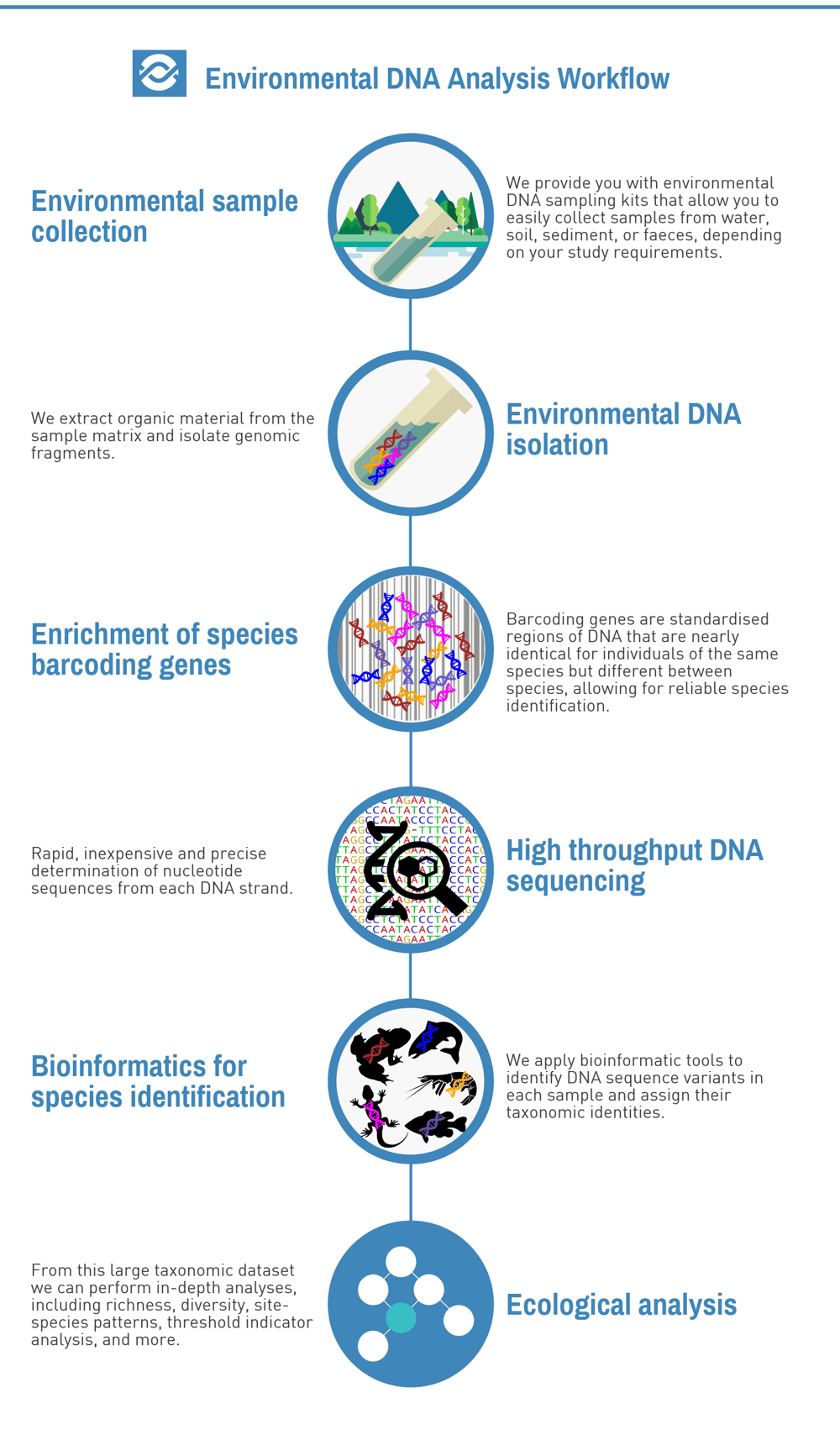Frequently Asked Questions
Environmental DNA (eDNA) is genetic material that is released by organisms living in their environment. Sources of genetic material may include, faeces, urine, skin cells, mucous, gametes, etc. The DNA in these sources will degrade over time but persist in the environment for long enough that we can detect the presence of the organism without having to observe or capture them.
Environmental DNA (eDNA) has a wide range of uses. For example, eDNA can be used for targeted detection of species of interest, biodiversity monitoring, species diet analysis, assessing soil health and also population genetics where similarities and differences can be identified within and between species. The applications are endless!
We have designed environmental sampling solutions for collection of seawater, freshwater, soils and sediments.
You may also be interested in collection of animal faeces, gut contents and tissues. We provide kits for those too.
Click here to get in contact with us to order your sampling kits.
The natural environment is large, heterogeneous and dynamically variable. Our experience has shown that the best way to maximise probability of detection, reduce inter-sample variability and ensure meaningful results for your site, is to collect large-volume eDNA samples. Which is why we have developed proprietary techniques for consistent large-volume environmental DNA sample collection and laboratory protocols for processing these large samples.
Our eDNA sampling kits make it quick and easy for you to collect consistent samples for reliable results. Each kit contains everything you need for sample collection, preservation and transport to our lab for analysis. We provide easy to follow field sampling instructions and we can deliver in-house training for your team.
As part of your sampling design, you should consider collecting repeat samples at the same location, collect replicate samples over time and at multiple locations.
We have extensive experience designing ecological field studies across many challenging environments. Contact us to discuss your project requirements.
For single species detection projects, your eDNA analysis report will include results of replicate or technical replicate assays and results of any laboratory and field control assays for each sample.
In multi-species monitoring projects you will receive results as described above, as well as a curated species list, statistical analyses of your surveyed sites and access to your project’s raw data stored on our servers.
Our laboratory has been purpose-built for environmental DNA analysis to optimise accuracy and speed of delivery.
Turnaround times for results vary greatly depending on the type of analysis being undertaken and the number of samples to be analysed.
Single species detection results may be delivered in as little as 2 business days and multi-species monitoring results in as little as 2 weeks.
Founded by professional ecologists and molecular biologists, with extensive global experience working across many industrial sectors in terrestrial, aquatic, marine and underwater environments, we are the experts in devising practical solutions for environmental genomics applications.
Contamination can arise in all steps involved in processing the sample. Both our water sampling kits suck water through the filter meaning that the same pumps can be used as the filters are upstream. This also means we minimise the use of single plastic consumables.
We provide videos to our clients detailing the sampling process and how best to reduce the risk of contamination in the field.
Our state-of-the-art laboratory operates in a one-flow direction. We have dedicated rooms for particular processes to minimise contamination, including extraction rooms, PCR setup and post-PCR processing.
All our laboratory processes include negative control samples and rigorous QC steps to ensure we provide you with the best integrity data.
We take pride in our commitment to minimising environmental impact. Our water sampling kits have been specifically designed to sample upstream of the pump, meaning that the same pumps can be used for multiple samples. This drastically reduces the amount of single-use plastics.
We re-purpose all unused sampling consumables for future kits to ensure for no wastage.
Our laboratory recycles all plasticware, and are a part of the Appleton Woods App Cycle 2.0 Plastic Recycling Scheme.
Additionally, the laboratory building has solar panels installed and there are electric car charging points as part of our commitment to energy efficiency and sustainability.

